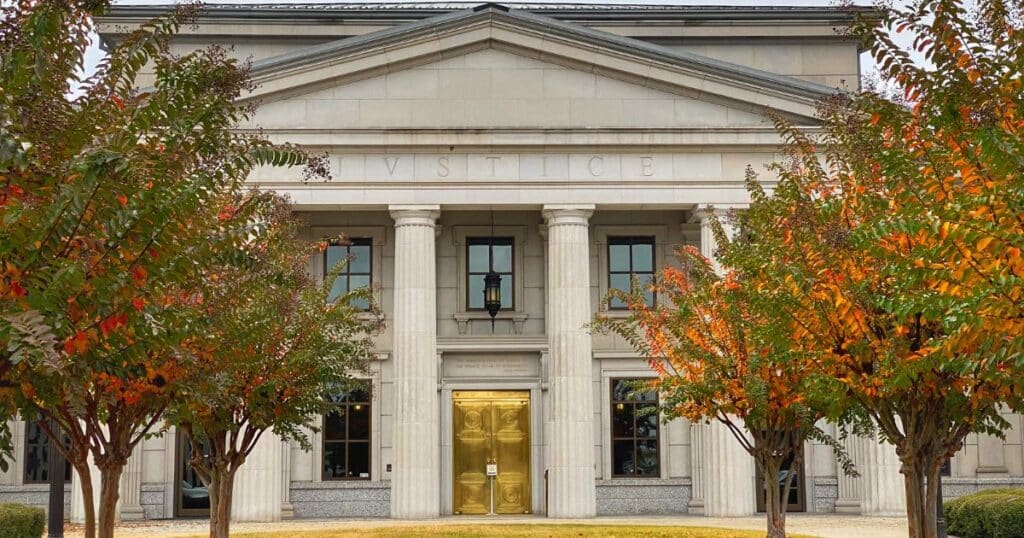In a landmark ruling, an Arkansas Circuit Judge declared 27 medical marijuana laws passed by the state government unconstitutional.
This comes as a surprise to many Arkansans who voted in favor of legalizing medical marijuana back in 2016. The main issue is that the changes made to these laws were done without popular vote or consent from citizens, violating people’s right to direct democracy.

The original Amendment 98, which allowed for the legalization of medical marijuana in Arkansas, was approved with 53% of the vote. Since then, the state legislature has been making various changes through legislation such as Act 4 (2017), Act 5 (2017), Act 479 (2017), etc., all of which have been deemed unconstitutional by Judge Morgan Welch.
These laws made changes such as criminal background checks, temporary licenses for dispensaries and cultivation facilities, employee protections, license expiry dates, creating a Medical Marijuana Commission, fines for rule-breakers, advertising regulations, taxation rules, and more.
Laws Voided in Recent Arksanas Ruling
Below are the laws voided by the recent ruling as reported by THV11, they give an in-depth view into all 27 laws.
- Act 4 (2017): This law changed how rulemaking dates were set. This law also changed how application dates were set for dispensaries and cultivation facilities.
- Act 5 (2017): This law changes the definition of “written certification” in Amendment 98.
- Act 438 (2017): This law prohibited patients from using telemedicine as a way to obtain a written certification.
- Act 479 (2017): This law banned Arkansas National Guard members from being “designated caregivers” to qualifying patients.
- Act 544 (2017): This law changed what’s deemed as an “excluded felony offense” in Amendment 98.
- Act 545 (2017): This law added criminal background checks to Amendment 98.
- Act 587 (2017): This law allowed temporary licenses to be distributed to dispensaries or cultivation facilities.
- Act 593 (2017): This law changed employee protections and how ‘written certification’ is accepted for employees using medical marijuana.
- Act 594 (2017): This law changed the frequency in which licenses expire. Instead of expiring one year after getting the license, it instead expires June 30.
- Act 638 (2017): This law created the Medical Marijuana Commission, to determine qualifications for licensure.
- Act 639 (2017): This law allowed fines to be given for those who break the rules of agencies like the Medical Marijuana Commission.
- Act 640 (2017): This law regulated the advertising, marketing, packaging, and promotion for dispensaries and cultivation facilities.
- Act 641 (2017): This law allowed the dispensaries and cultivation facilities to transfer licenses.
- Act 642 (2017): This law added licenses for those who transport, distribute, and process medical marijuana.
- Act 670 (2017): This law changed the taxation of medical marijuana and how proceeds are distributed.
- Act 740 (2017): This law changed the locations in which Arkansans are able to smoke weed.
- Act 948 (2017): This law required the data of qualifying patients and dispensaries to be reported to the Arkansas All-Payer Claims Database.
- Act 1022 (2017): This law allowed seeds, cuttings, clones, and plants to be acquired by dispensaries.
- Act 1023 2017: This law made it to where packaging of medical marijuana would need to be child-proof and set THC limits.
- Act 1024 (2017): This law required dispensaries to make vaporizers available to qualifying patients and to appoint pharmacist consultants.
- Act 1099 (2017): This law established that a person under the influence of marijuana shouldn’t be allowed on public school campuses.
- Act 1100 (2017): This law established security and safety requirements for cultivation facilities. Also changed how close a facility can be to a school and other buildings.
- Act 1 Ex. Sess (2017): This act was a series of technical corrections to Amendment 98.
- Act 8 Ex. Sess (2017): This Act worked as a way to integrate and incorporate all of the acts into law.
- Act 694 (2019): This act granted the ability to change spelling, correct errors, and make other changes.
- Act 1004 (2019): This law added a disability facility to the proximity rules, laid out in Act 1099 of 2017.
- Act 666 (2021): This law modified the requirements of a pharmacy consultant and whether a patient need to meet after a written certification is given.
Explanation of Arkansas Judge’s Ruling and Its Implications
Judge Morgan “Chip” Welch, who’s ruling overturned 27 medical marijuana laws in Arkansas, stated that these laws violated Amendment 98, which was passed through popular vote, and therefore any changes to it needed to be done through the same process. He argued that since no vote had been held on the subsequent legislation, it was unconstitutional and invalid.
The implications of this ruling are far-reaching for the state of Arkansas. It means that all the changes to medical marijuana laws made without a popular vote are now void and will need to be reworked with citizen input before they can become law again. This could set a precedent for states where similar changes have been made without voter approval or consent.
Why Making Changes Without Popular Vote Is Unconstitutional
Making changes to laws without consent from citizens is a violation of their right to direct democracy, which was established in the original Amendment 98 when it was originally passed.
In addition, making changes that impact the lives of citizens without their authorization or approval can have far-reaching consequences and erode people’s trust in government.

This ruling serves as an important reminder that any changes made to laws must be done through legitimate channels, such as public engagement and voting, in order for them to be valid. Otherwise, they will not stand up against constitutional scrutiny.
It also underscores the importance of direct democracy and how it protects people from having their rights taken away by governments or corporations without their knowledge or consent.
It ensures that everyone has a voice and that their opinions are considered when it comes to making decisions that affect them. Without the right to direct democracy, citizens would be left with no way to protect themselves from government overreach or corporate greed.
What Does This Means for the Future of Medical Marijuana in Arkansas?
The ruling by Judge Morgan “Chip” Welch overturning medical marijuana laws passed by the state government serves as an important reminder of why direct democracy is essential and how any changes made without a popular vote can be deemed unconstitutional.
It also underscores the importance of protecting people’s rights and ensuring that all decisions are made through legitimate public engagement and voting.
This ruling will have far-reaching implications for the future of medical marijuana in Arkansas. All the changes made without a popular vote will now need to be reworked with citizen input before they can become law again.
It also serves as an example for states where similar changes have been made without voter approval or consent.
Ultimately, this ruling highlights the importance of direct democracy and protecting citizens from government overreach or corporate greed.
Enjoyed that first hit? Come chill with us every week at the Friday Sesh for a freshly packed bowl of the week’s best cannabis news!
















